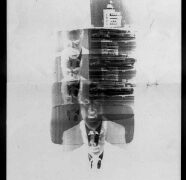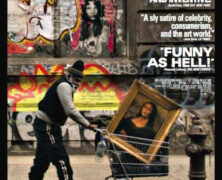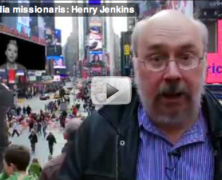Assuming its intent was to provide a kind of push-back, heading into the midterm elections, against the right wing momentum generated by Glenn Beck’s Rally to Restore Honor, Jon Stewart and Stephen Colbert’s pre-election Rally to Restore Sanity/Keep Fear Alive served as a useful reminder that the discourse of fear is not one that favors the left. But it doesn’t seem to have served for much more than that. John Boehner – yet another Republican whose name reminds us of a sexualized part of the human anatomy – is the new face of political power in the United States, which is bad news for progressives unless they happen to be of the smarmy t-shirt making variety (and for those who are, I offer up the following t-shirtable slogan, free of charge: “Put a Dick and Bush together and what do you get? A Boehner!”). As for the part of things the Stewart/Colbert rally seemed to get right, the reasons for this are effectively and polemically synthesized in Alain Badiou’s recent book on France’s rich, xenophobic dickhead of a president Nicolas Sarkozy, The Meaning of Sarkozy. In remarks delivered during a seminar just after the aforementioned rich xenophobic dickhead’s election in 2007, and later rewritten as the second chapter of the aforementioned book, Badiou offers an “analysis of the electoral context” in France that could just as easily be applied to the recent electoral context in the United States. “[T]he situation,” Badiou writes of the campaign cycle that ended with Sarkozy’s triumph, “was one of a conflict between two fears, an original fear and a derivative one. The original fear belongs to the section of the population who dread something happening that will precipitate their decline, and it is, Badiou writes, “focused on the traditional...
Notes for Right Now: In Defense of Facebook?...
posted by Eli S. Evans
Strange that I would feel motivated to compose a defense of Facebook, of all things, n precisely this moment – strange for at least a couple of different reasons. Strange, first of all, because I have not seen, nor do I plan to see, The Social Network, the much-ballyhooed new movie about Facebook’s founding father, Mark Zuckerberg (ex-CNN talking head Rick Sanchez would likely point out, at this point, that with a last name like that, the guy’s almost certainly a Jew). Not just because the movie seems perhaps a bit too timely to strike me as worthy of critical attention, but also owing to more personal matters. Zuckerberg, billionaire at the precocious age of twenty-six, with his signature jeans and t-shirt (or sweatshirt when its chilly) non-outfits that some in the fashion world have declared the epitome of the new banker chic – the look that goes with access to and control over the movements of large quantities of capital – and his penchant for computer programming, reminds me of my cousin Andrew. Like Zuckerberg, Andrew spent his time in college less on schoolwork (I think he was a psych. major, but I’d have to double check that) than on partying with friends and, more importantly, fiddling about with computers. Like Zuckerberg, Andrew signifies to the world the – from my perspective – enormous quantity of money to which his person corresponds not by wearing expensive, designer clothes but, precisely, by not wearing expensive, designer clothes, and instead wearing whatever the fuck he wants (and nothing says “I’m wearing whatever the fuck I want” like jeans and a t-shirt). As for the money itself, the precise figures are, naturally, a carefully guarded family secret. But a secret is not carefully guarded unless it is...
Notes for Right Now: A Different Kind of Terror...
posted by Eli S. Evans
In the hours and days after the messianic histrionics of Glenn Becks Restoring Honor Rally, most in the media seemed to find themselves inspired to analyze the proceedings in terms of a turn toward God, on the part of this supposed newsman turned newsmaker. A rather flimsy analysis, I thought, for it only parroted Beck’s own pronouncement, during the rally—drenched in the adoration of his followers—that “today is the day America turns back to God.” Perhaps history will show him to have been prescient. But the question, while we wait, is: to just what God might Beck, or even America, have been turning (or turning back) on the day Martin Luther King’s “I Have a Dream” speech was forever contaminated? As a Mormon, of course, Beck himself probably doesn’t understand what God, or gods—or, according to some accounts, aliens—he worships, or is descended from, or is in the process of becoming. As one of the unquestionable leaders of the increasingly politicized and, therefore, increasingly dangerous turn-of-the-century American evangelical movement, on the other hand, there can be little doubt that the God to which Beck referred during his Dream Day rally was the Judeo-Christian one to which that movement traces itself (in reality, of course, it is just one of what are surely an endless number of bastard children of 1980s televangelism). Perhaps, however, things aren’t as obvious as they appear—or, in any event, as Beck and his cabal of cohorts would like them to appear. Despite a Bar Mitzvah (a year later than is typical, for reasons I won’t get into here), I am no theologian. Nonetheless, I did once read the Book of Job (in its English translation) for a seminar on tragic literature taught by a middle-aged French moral philosopher who shall...
Doomocracy: Hip Hop’s Disco Phase...
posted by Victor An
I grew up in the era of grunge. I still remember the first time I saw 1,000 kids going nuts to “Smells Like Teen Spirit”. It was an under twenty-one club in Quebec during the winter carnival. I was seventeen and half drunk on the mixture of red wine and grain alcohol they called caribou. It was the first time I realized that there was a spirit to an age. I had always read authors who insisted on what I thought was a gross oversimplification; now I am one of them. There are key moments when the music, sometimes a specific song, acts as the most perfect and concise description of the collective consciousness. We are not in such a moment. We are living through the era of Hip Hop disco, the awkward adolescence of this art form. Browse the charts, or better, tune in Top 40 radio, and you will find that Taio Cruz “came to dance, dance, dance, dance,” that Enrique Iglesias and Pitbull like “the way you move on the floor,” that Usher admits the “DJ Got Us Fallin’ In Love.” As a phenomenon, this music is neither very interesting nor particularly relevant. I never thought Hip Hop, a form that is laudable in many respects would look to or indulge in disco, a style that is looked back on with almost universal derision. The problem, just as it was in the 70s, is the site of the music. The 70s saw the site of music swing towards its extremes. On the one hand, it located itself in the garage. The children of the first generation born into Rock & Roll took their second hand instruments and their worn down ideas of music and turned them into something in which the...
Notes for Right Now by Eli S. Evans: On the Spectacle of The Disaster...
posted by Eli S. Evans
For weeks, now, online news outlets have been running live streaming video of the Gulf Coast oil leak, courtesy of British Petroleum. And I don’t mean, by this, that the oil leak itself is courtesy of BP—which, of course, it in large part was and is (but also of the whole bloody system that produces and sustains something like BP in the first place)—but that the live streaming video has been provided by BP itself, as a part of the company’s damage-control performance of a commitment to keeping the public abreast of the situation. The idea seems to be to counteract the negative publicity that has resulted from the oil spill itself and the unprecedented environmental and economic damage that has attended to it with a show of unprecedented corporate transparency. But if the live streaming video of the underwater leak is its sign and symbol, BP’s turns out to be an odd sort of transparency, indeed no matter what time of the day or night one tunes in to the underwater video feed, what one sees is always the same: a hopelessly muddy image, as though photographed through a mud-covered lens, of a kind of muddy muddiness gushing into muddily muddy water. If there were any doubt about the muddy opacity of all of this transparency, it was erased once and for all when, just the other day now, we were treated to muddy underwater footage of actual mud being pumped into the underwater oil well in yet another effort to somehow staunch the spewing. It’s difficult not to wonder if, in predictably cynical fashion, BP located precisely that point of view from which seeing absolutely everything meant seeing absolutely nothing at all—just mud in mud through mud—and promptly installed their show-the-public-everything cameras...
Radio Alice
posted by Rosetta Brooks
Radio Alice was a free radio station in Bologna from 1973-1977. Rathr than attempting to objectify events in the world, they set out to create a flow of sounds, information, messages and poetry, silences and abuse. Like the manifestations of Dada, transmissions were seen as immediate cultural subversions. Bifo, who worked on Radio Alice was interviewed by Carlos Ordonez at the recent conference on Autonomy (’After Marx, April’) in London. The interview was conducted in English. The autonomia movement in Italy during the seventies emerged from the new proletariat of disaffected and unemployed youth, workers and intellectuals creating a radical opposition to institutional politics. ‘Autonomy has no frontiers. It is a way of eluding the imperatives of production, the verticality of institutions, the traps of political representation, the virus of power. In biology an autonomous organism is an element that functions independently of other parts. Political autonomy is the desire to allow differences to deepen at the base without trying to synthesize them from above,to stress similar attitudes without imposing a general line, to all parts to co-exist side and side in their singularity.’ Sylvere Lotringer ‘The Return of Politics’ ‘Autonomia’ issue of Semiotext(e) Q: How did Radio Alice begin, and what experiences did it attempt to address? Radio Alice started in February 1976 with people who came from the experience of Poterio Operia, a leftist revol~tionary group and people involved in the movement of Autonomia. We did not think of Radio Alice only as a political means but, first ofall, as a possibility of organising the experiences of a homogenous community. We were speaking of little groups – feminists, gays, workers. I emphasize this \’little group\’ character because we did not conceive ofthe radio as a political organisation that has to \’state decide\’...
Doomocracy: Exit Through the Gift Shop and Other Visions of the Apocalypse...
posted by Victor An
Dispense with the posing and what are you left with? I would like to be able to answer this question for you, but the pose is the defining feature of our time. Were you to dispense with it, no one could predict the catastrophe. Like everything else that we are paranoid about failing to recognize about the twenty-first century, street art is not new. It is not a new route to cultural significance. It is not an unlikely voice for counter messages. It is not an entity without a history, or precedence, or a canon. The soundtrack is The Velvet Underground fed into a loop. There is a knock-knock joke about a writer of fortune cookies; I can’t remember the punchline. I once tried to explain visual literacy to my mother. It didn’t go well. I kept coming back to the issue of profanity. “Skull fucking” nets 2,980,000 hits on bing. The revolution will be sponsored. Is feedback really that interesting? I like going to the movies alone. I go to the $2 theatre. They don’t really mind if you drink. The venue could have easily housed a porno theatre, but video killed that off. The theatre is properly debased. The seats are broken. The screen is stained with sticky splotches; soda is semen. It is the best venue to watch a blockbuster I have ever found. The star is the green stripe down the screen. Every generation believes that the world will end on its watch; is it ego? What does it mean to be famous and a recluse? The thought police have declared war on the oxymoron. I can’t remember the last time I saw art in an art gallery. I was promised ‘reciprocal ferocity;’ instead, I get Laura Owens (3,240,000 results)....
Transmedia Missionaris:...
posted by Rosetta Brooks
A Polylogue I’m sitting at my desk listening to music not through earbuds but through my open windows. The street’s alive with salsa. It’s definitely not transmedial. You’d have to be here now. I’ve listened to Henry Jenkins talking about transmedia missionaries on Youtube. I tried to listen to someone named Jeff Gomez, who’s also championing transmedia storytelling on Youtube, though he’s in the entertainment industry and not an academic. I’ve got little stomach for all the applause. So many hands, so little variation. If there are indeed innumerable hands clapping along to The Matrix—or “Yes, We Can”—does this necessarily mean a shift in the content of public discourse? Jenkins talks about a transmedia revolution that will wrest control from power structures, whether the government’s or those of the entertainment industry, and allow the storytelling power of “real” people to redefine social priorities. He sees us as moving from a spectator culture to a participatory one, and I agree, but has our constant participation really challenged the old Situationist model of the society of the spectacle? As we real people Tweet and update our status on FB, most of us seem happy to be images, snapshots, even. It seems to me that we have internalized the dominant models of image and discourse, which we then propagate across lo these many platforms, calling them proof (after proof) of our very own unique participation, shot round and round the flattening globe. It makes me think of Neil Postman’s argument that we are simply entertaining ourselves to death, at the cost of losing the habit, if not the ability, to engage in subtle and effective discourse. Ok, I realize that Obama couldn’t have become president without tapping into the phenomenon of transmedia. But there were also a...
LiveNewsCameras.com
posted by Victor An
We no longer live in the world of 24 hour news. We no longer live in a world of polished spin, of coif and smile, and the confidence scheme wherein the delivery of “news” is a sleight of hand. Theoretically, LiveNewsCameras.com (LNC) does not contain anything revolutionary, or even new. The world of news aggregators is crowded by bullies; all the major names are represented disproportionately, with varying levels presumed and apparent mediation. Equally, the concept of the unedited news feed has been around since the first commercial satellite dishes could pull in network feeds in the 1970s. Equally, there is a noble history of journalists, researchers, and media-junkies who have dedicated themselves to unmasking the propagandists, so why then LNC? Once upon a time, not necessarily when I was a young artist, perhaps before, and perhaps before I knew what name to give it, I decided that it would be a useful skill to know how to produce the “magic effect.” It was at a time when I was obsessively watching all the con man movies I could find. I was a student of that moment, the split, the turn, the thing that artists and theorists and philosophers spend so much time thinking of new vocabulary for. LNC is magic set to 180 beats per minute. Sugarcane distilled. Poppies refined. 169 self-refreshing and streaming screens of news from around the world in which the commercials have been replaced with a peek behind the curtain. News/reality/actuality presented simultaneously and without hierarchy. Ever wonder what Al Jezeera’s election coverage has in common with that of Bristol TN’s Channel 11? (Hint: they both insist on including and over-pronouncing “Rodham.”) There are, though, more profound insights to be had: It would be funny if weren’t so frightening...










